AMD's Ryzen 9 6900HS Rembrandt Benchmarked: Zen3+ Power and Performance Scaling
by Dr. Ian Cutress on March 1, 2022 9:30 AM ESTPerformance Per Watt
With the ASUS Zephyrus G14, it comes with some fancy ASUS software called the Armo(u)ry Crate. Inside is the usual array of options for a modern laptop when it comes to performance profiles, fans, special RGB effects and lighting, information about voltages, frequencies, fan speeds, fan profiles, and all that jazz. However inside the software there is also an interface that allows the user to cap how much APU/SoC power can be put through the processor or the whole platform.
With this option, we took advantage of the fact that the after we select a given SoC wattage, the system will automatically migrate to the required voltage and frequency under load while only ever going up to the power limits - or as much as the system would be allowed to. Using this tool, we ran a spectrum of performance data against power options to see how the POV-Ray benchmark would scale, as it is one of the benchmarks that drives core use very high and very hard.
In this first graph, we monitor how the CPU voltage increases by raising the power, as well as the at-load temperature of the processor. The voltage increments start off around the 60-65 mW per 5W of SoC power, eventually becoming 15-25 W due to the way that voltage and power scales. The temperature was a very constant rise, showing 96ºC with the full 80 W selected.
Now if we transition this to the benchmark results, as we plot this with the all-core frequency as well:
These two lines follow a similar pattern, as the score doesn't increase if the frequency doesn't increase. The biggest jumps are in the 15-35W mark, which is where most modern processors are the most efficient. However as the power is added in, the processor moves away from that ideal efficiency point, and going from 50 W to 80 W is a 60% power increase for only +375 MHz and only +7.7% increased score in the benchmark.
We can pivot this data into something a bit more familiar:
Here we can see the voltage required for all-core frequencies and how the voltage scales up. With all this data, we can actually do a performance per watt graph for Rembrandt:
In this graph we're plotting Score per watt against Frequency, and it showcases that beyond 2.5 GHz, the Rembrandt CPU design becomes less efficient. Most modern processors end up being most efficient around this frequency, so it isn't perhaps all that surprising.
Now all of this is also subject to binning - not only are chips binned by the designation (6900HS vs 6800H for example), but also within an individual SKU, there will be better bins than others. We see this in some mobile processors that can have 10+ bins with different voltage/frequency characteristics, but all still called the same, because they perform at a shared guaranteed minimum. With smartphones, this testing is a lot easier, as that voltage/frequency table is often part of the hardware mechanism. But for notebooks and desktops, we're often at the mercy of the motherboard manufacturer or OEM, who can use their own settings, overriding anything that Intel or AMD suggest. Hopefully in the future we will get more control and be able to determine what is manufacturer based and what is motherboard based.


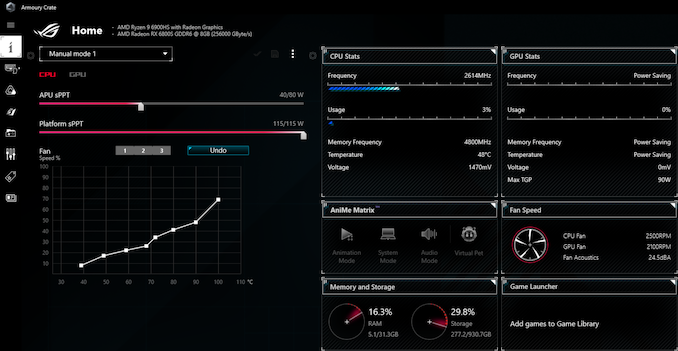
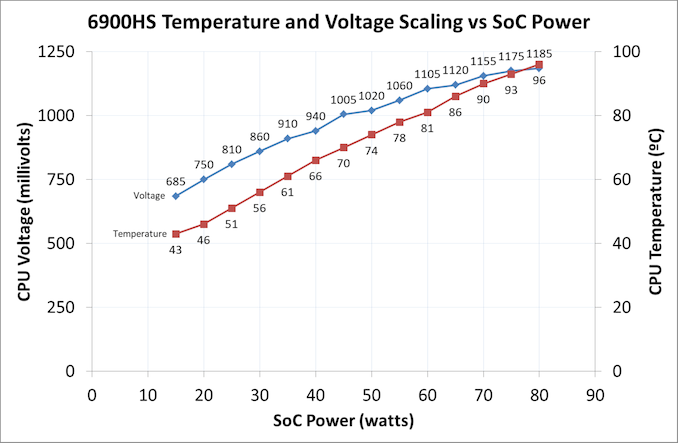
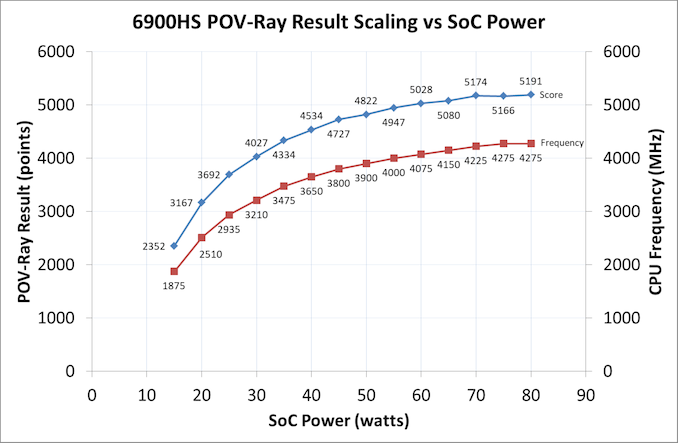
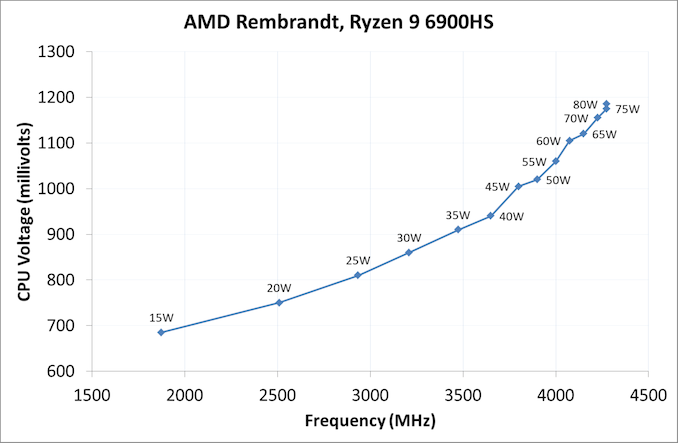
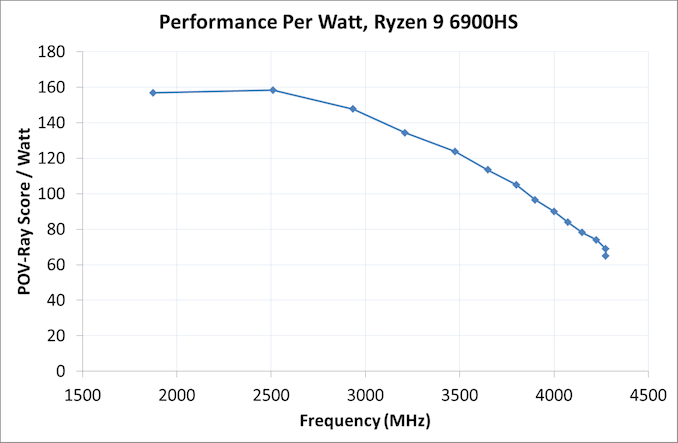








92 Comments
View All Comments
mode_13h - Friday, March 18, 2022 - link
> I haven't seen most of the anime you mentionedThe Patlabor OAVs and movies are good for an 80's/90's nostalgia hit, IMO. It's that sort of old timey mecha anime that attracted many of us to the anime multiverse, in the first place. When I watched the OAVs on blu ray, the restoration was fantastic. Very crisp HD.
> the new Dune was a big disappointment to me.
Yeah, I read the trilogy before watching it. I'm so glad I did, because I knew exactly what was going on. Otherwise, I might've been lost.
Yeah, they tried too hard to follow the narrative of the book. I think the only way to do it, and still end up with a good movie, is to focus on a particular story arc. If they'd nailed it, that would've set the stage for more to follow.
I'd imagine they shot so much footage that it could conceivably be re-edited. I know they didn't shoot beyond the movie's ending, because I saw an interview with Zendaya, where she said she was only on location for the desert scenes for a couple days.
mode_13h - Friday, March 18, 2022 - link
I mean the original Patlabor OAVs. There are about 7 of them, I think. Near movie-quality animation, for the time.BTW, some aspects of the Ghost in the Shell franchise definitely make more sense, as we move towards the future it predicted.
Oh, and Planetes is a nice series about a crew working to collect orbital debris. It aired about 2 decades ago, but I think it was based on manga that was older, still. Some aspects of it were a bit anachronistic even for the time, but other aspects about space physics and orbital living clearly received a lot of thought and attention. The story arc is a lot more interesting than it sounds, with lots of commentary about life, love, the privatization of space, corporate politics, geopolitics, personal ambition, and the ultimate path and personal costs of space exploration. If you don't mind a bit of slapstick and are willing to look past some of the more anachronistic aspects, it's worth a watch.
GeoffreyA - Saturday, March 19, 2022 - link
I haven't read the books but hope to do so before going into the coffin. Well, my view is that the excessive realism somehow harms the movie. If you go back to Lynch's 1984 version, despite the outlandish visuals, it is pretty alien, as Dune should be; and from a storytelling point of view, does that pretty well, going forward rapidly. Also, the princess's summary in the beginning got the viewer up to speed with this strange universe.The new movie took "show, don't tell" a bit too far, and the story didn't feel cohesive or unified, especially towards the end. It was tedious. The visions seemed forced and overdone. And for an epic, the cinematography was poor in my opinion. A key problem, I feel, is that it didn't bring out the true spirit of the desert. Coupled to this issue is Zimmer's music, in my view, missing the mark. It was too loud and vulgar, and seemed to view the desert from a commercialised, Hollywood lens, rather than feeling its power and reflecting that desolation. Then the CGI, I say no more.
On the plus side, two sequences were outstanding: when Paul first steps onto the desert and picks up the sand/spice; and Paul and his mother's flight through the dust storm. That was world class.
GeoffreyA - Saturday, March 19, 2022 - link
When I saw the Patlabor poster some time ago, I was intrigued. That was part two I believe. Yes, as time goes by, I prefer to look back at older anime. I think it's fair to say the industry has gone downhill these days.And thanks for that great description of Planetes. I won't mind giving one or two episodes a go and seeing what it's like. It reminds me that I've still got to watch Cowboy Bepop.
mode_13h - Sunday, March 20, 2022 - link
Planetes is one of those series that takes a while to get going. The further you go, the deeper it gets. If you really don't like the first couple episodes, maybe it's not for you. However, you do get rewarded the longer you stick with it.mode_13h - Monday, March 21, 2022 - link
> I haven't read the books but hope to do so before going into the coffin.There's a lot you can read into it about the corrupting tendencies of empires and exploitation of peoples and their natural resources. It feels like it might've tapped into the decolonization zeitgeist, or at least what I presume it should've been, as the former colonial powers of Europe unwound their foreign holdings. I could do without so much of the psychedelic stuff, but I know Heinlein also went there. So, maybe that was just another trend in 1960's sci fi.
> If you go back to Lynch's 1984 version
It's funny this came up, because I just started watching it last weekend and finished it mere hours ago. It did seem a bit overwrought. I remember how he seemed rather too fascinated with the perversions and excesses of the Harkkonen. I thought the exposition was a bit too much for the naive movie-goer, but probably a helpful reminder for those who'd read the books years earlier.
Since I came to it with low expectations, I really wasn't disappointed. Since the movie had many shots in low light, I wonder just how much I benefited from seeing a clean, HD presentation. Overall, I guess my main complaints would be that some of the acting seemed sub-par (Sting, for one, definitely should've stayed focused on the music business) and I just wouldn't have tried to cover so much plot. It felt busy and probably hard for people to follow, without having read it. I wasn't too bothered by the dated special effects, but they do kind of jump out at you. Some of the sets were quite impressive.
> The new movie took "show, don't tell" a bit too far
Probably a reaction to Lynch's version. I also wonder if his 1990 TV series, Twin Peaks, was also sort of a reaction to the criticism he got for too much exposition in Dune.
Anyway, the last I'll say about it is that I'm finding the Wikipedia page on Dune to be a good resource on the author and his influences.
GeoffreyA - Monday, March 21, 2022 - link
The visuals prevented me from watching it for a long time. It was only after I became a fan of David Lynch that I was able to see past that and appreciate what he had done. I think for a two-hour adaptation of such a vast novel, it is a commendable attempt, and I prefer it. As for the excesses, etc., well, that's Lynch as always. He always tends to bring out the darker side of things.I actually love Twin Peaks, and the recent season 3 was spectacular, if strange. But strange is this man's domain. Did too much exposition have an effect on his later work? I would say that Dune was an exception. Generally, his films are pretty obscure, nothing much being spelled out, and one often has to piece together a puzzle. He started off with that note in Eraserhead and hasn't really changed in four decades.
GeoffreyA - Monday, March 21, 2022 - link
"Sting, for one, definitely should've stayed focused on the music business"The best line!
mode_13h - Tuesday, March 22, 2022 - link
> I actually love Twin PeaksI never really watched it. My older sister watched the original TV airing. All I remember of it was the general strangeness and a recollection that even its conclusion left much unanswered.
I haven't seen much of Lynch's work, but I did enjoy Mulholland Dr. All I remember from it is that I decided it's a fool's errand to make complete sense of the plot, since there were paradoxes inserted seemingly with the intent to break any strict interpretation.
> Did too much exposition have an effect on his later work?
That's not really what I meant. I was suggesting he got too much negative feedback on all the exposition in Dune, and therefore went too far in the other direction of being too obscure.
From what I've heard, Kubrick would sometimes indulge in excessive obscurity to create a false sense of depth. The prime example being 2001: A Space Odyssey. If you actually read the book, you can supposedly see what kind of shenanigans he got up to, which I've heard he even admitted in an interview.
> He started off with that note in Eraserhead and hasn't really changed in four decades.
Ah, right. I never got round to watching that one.
GeoffreyA - Wednesday, March 23, 2022 - link
Mulholland Drive is perhaps my favourite film of all films. Again, it's the tragic note that speaks to me, and Naomi Watts, brilliant. I've racked my head over this story a great deal, and my tentative answer is that even the latter part, Diane's tale, is a dream, various pieces of evidence pointing there, particularly the blue box and the smoke. The question is, whose dream is *that*! Perhaps it's the director's dream after all.I haven't read 2001, but you're right, the film keeps things pretty bare and mysterious, and that creates the feeling of a deep, even terrible, mystery. Our age could actually learn something from that and stop filling in all the details. The human mind does a far better job at piecing together the monster in the shadows.